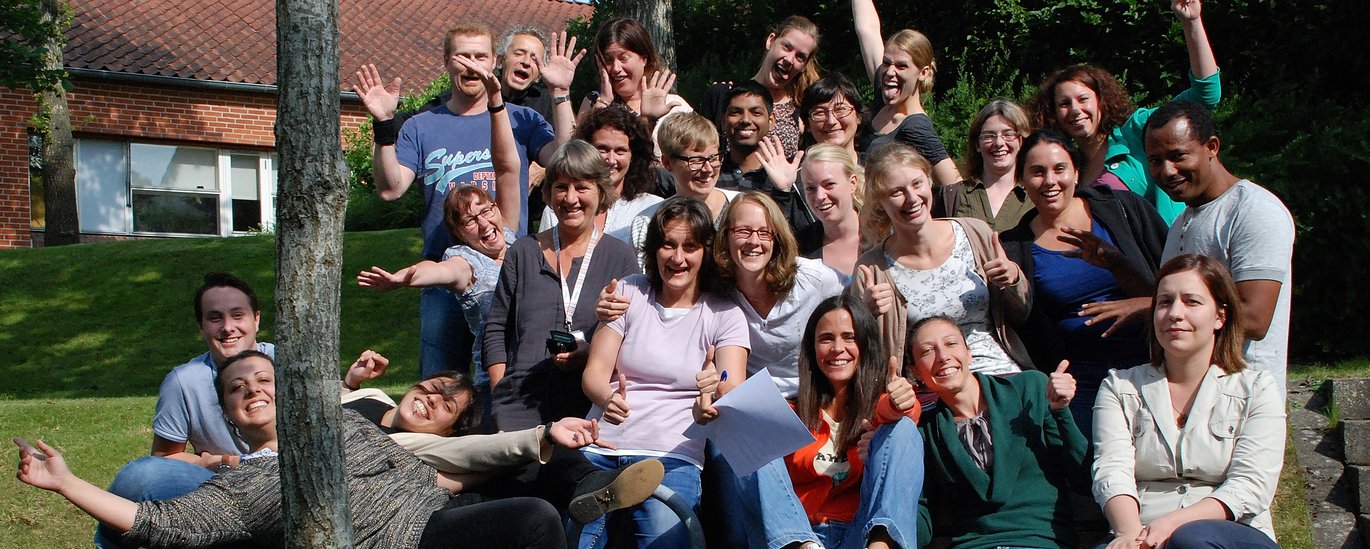PhD students from all over Europe met in Foulum
Thanks to a large European research network, the Department of Animal Science managed to attract PhD students from 14 different countries when it in August hosted a two-week summer school on gastrointestinal health of pigs.

Good networking is valuable - also in research. It is therefore important that young researchers have the opportunity to meet foreign colleagues early in their career and establish good contacts across universities and borders.
This option was exercised to the full when in August this year 20 PhD students visited Aarhus University in Foulum to participate in the PhD course 'Gut Biology and Health'. The Department of Animal Science hosted the course and over the two-week period they ensured that the students were introduced to various microbiological and immunological aspects of gastrointestinal health and could take home both theoretical and practical experience when they left.
It was the second time that the course was held; the first time was in 2013 when there were 12 participants, comprising mainly the department’s own PhD students, while this year there were 30 applications for 20 places. The strong interest for this year's course is, according to the organisers, because it was held as a combination of a PhD course under the faculty's graduate school (GSTS) and a summer school under the auspices of the European research network PiGutNet (European network on the Factors Affecting the gastro-intestinal microbial balance and the impact on the health status of pigs).
PiGutNet is a so-called COST Action, which supports networking, by, for example, paying the costs of extended visits and travel abroad. Head of Research Section Charlotte Lauridsen at the Department of Animal Science and her colleagues from the section of immunology and microbiology have had a central role in building the network, which was launched this year and runs until 2018.
- It has been crucial that we have been part of this network, as it has meant that in addition to our own PhD students we had participants from institutions in 13 different countries, says Senior Researcher at the Department of Animal Science, Ole Højberg, who co-organised the event with his colleagues in the section of immunology and microbiology.
Hands-on research
The programme included on the one hand 17 scientific lectures where guest lecturers from prominent universities in England, Italy and France contributed together with researchers from the University of Copenhagen and a number of the department's scientists. This was, inter alia, made possible by a grant from the Villum Foundation (VELUX Visiting Professor Programme).
In addition, the course included a range of practical exercises in the laboratory. Following the course, the organisers have received a string of top marks from participants who reported that they had enjoyed the mixture of theory and practice.
- We have focused on providing students with an opportunity for hands-on research. They were, for example, given the task of slaughtering a pig and sampling material that they would need for microbiological and immunological analyses. There were quite a few who had not tried that before, and most of them therefore thought it was enormously exciting, explains Ole Højberg, adding that the participants likewise had been very enthusiastic about a field trip to the Laboratory for Pig Diseases, SEGES, in Kjellerup.
The students also had the opportunity to present their individual research projects and exchange experiences. Evaluations show that it meant a lot to them that they had an intensive course – and the students report that they profited from building both a social and a professional community.
- One should not neglect the networks and research community that are created already when you are a PhD student. It is something I think they will appreciate in the future, says Ole Højberg who can only recommend that colleagues make full use of the available opportunities to work across national borders - for example, under the auspices of a COST action.
- It’s good publicity for the university to create a course that attracts so many international researchers. By holding a course like this, we are advertising our existence in relation to European research in this field, and when students get home and have had a positive experience, this information may well be passed on to other colleagues who suddenly become aware of us. It may ultimately help establish externally funded projects.
The organisers of the course expect to repeat the course in two years’ time.
Further information
Senior Researcher Ole Højberg
Department of Animal Science
Phone: +45 87157792
Email: ole.hojberg@anis.au.dk
Section Manager Charlotte Lauridsen
Department of Animal Science
Phone: +45 87158019
Email: charlotte.lauridsen@anis.au.dk
Funded by: Graduate School of Technical Sciences (GSTS), COST Action FA1401: PiGutNet and the VELUX Visiting Professor Programme.
